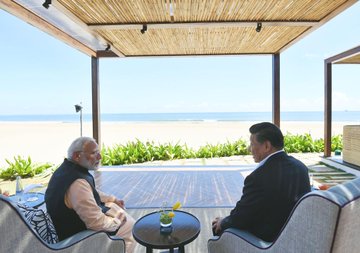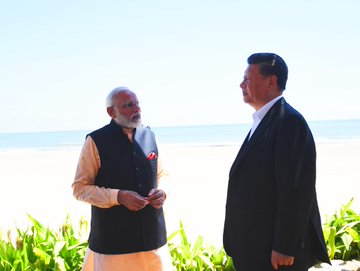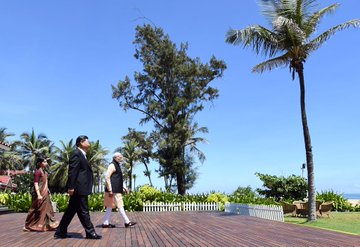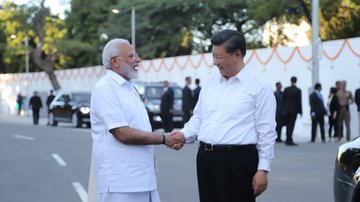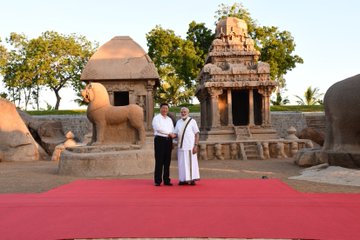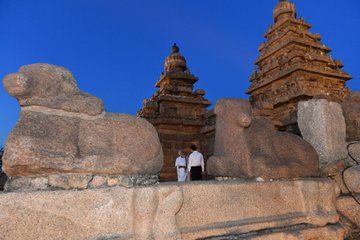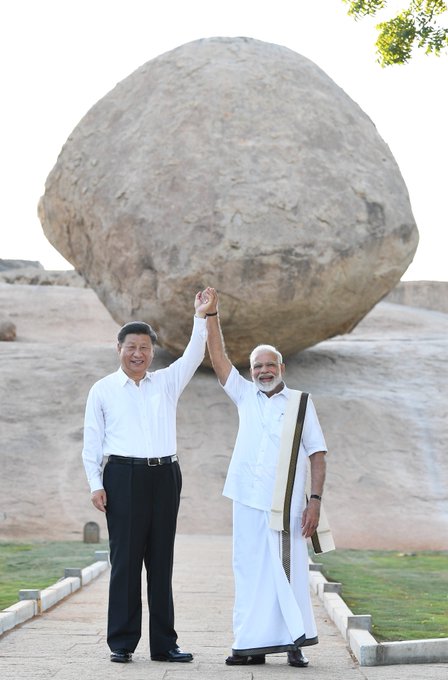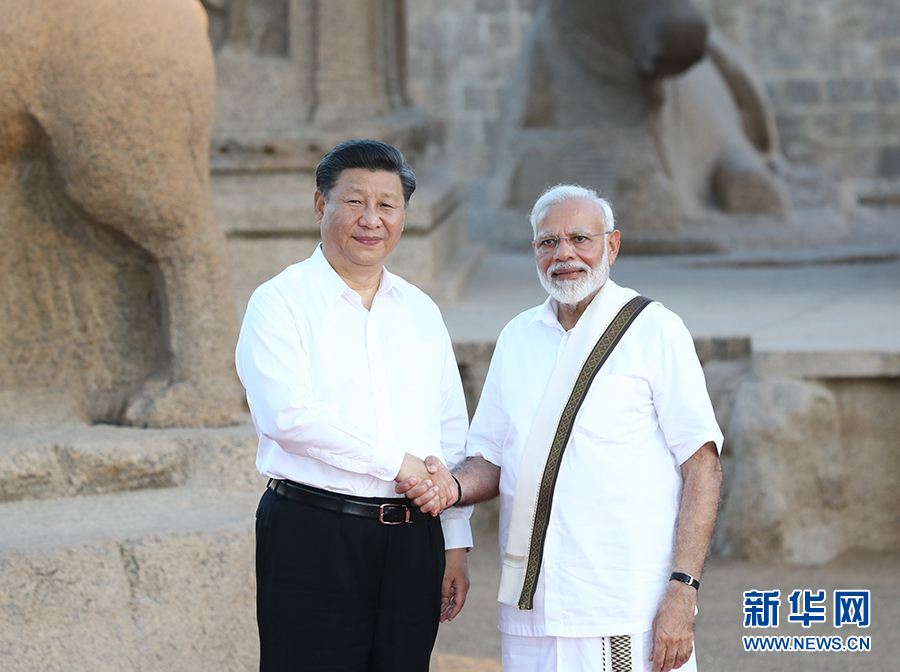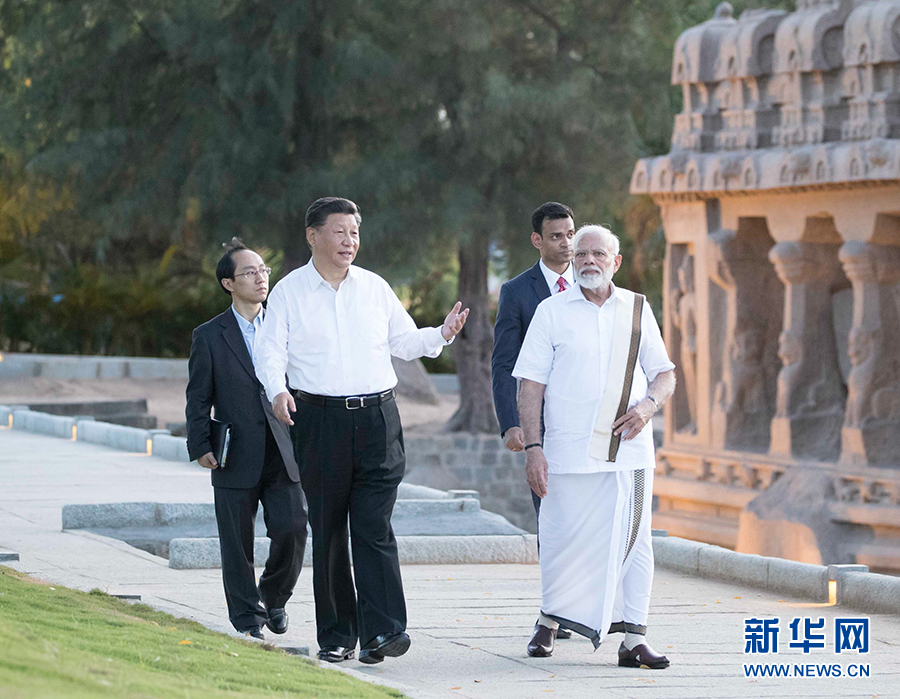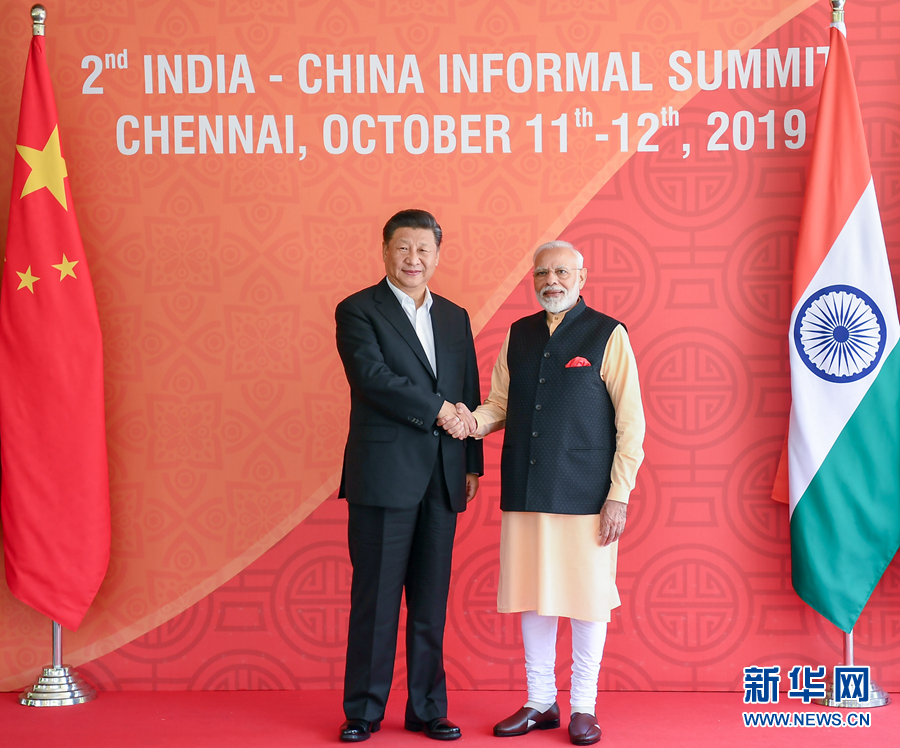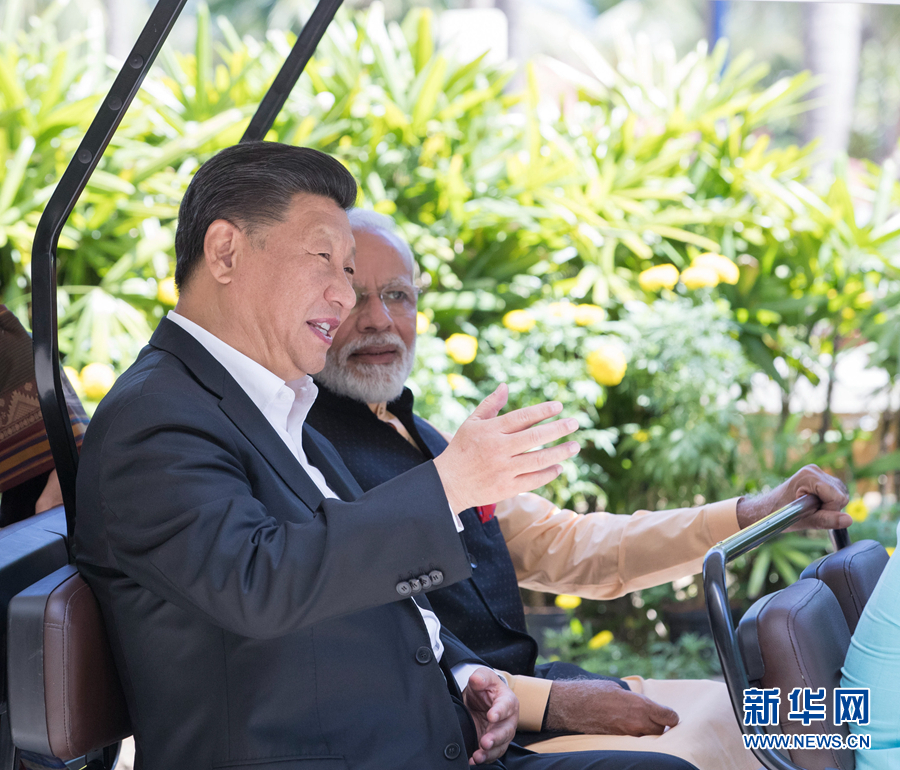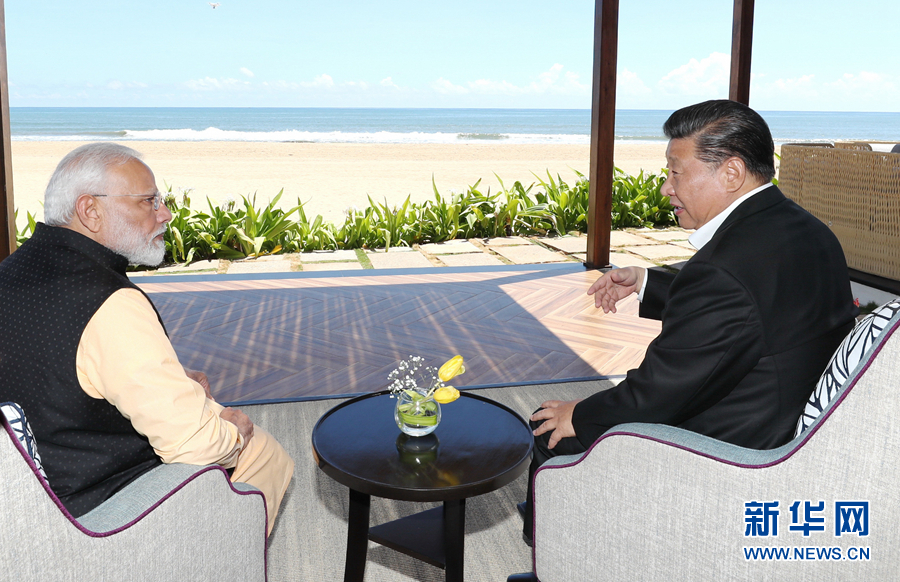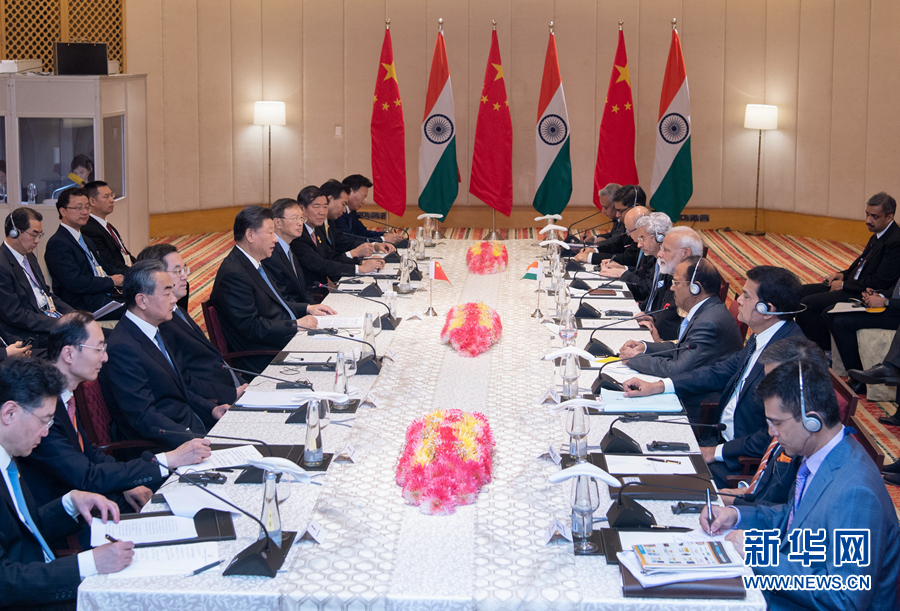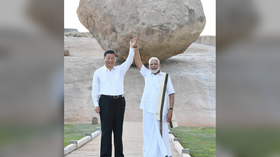- Joined
- Nov 29, 2016
- Messages
- 5,674
- Points
- 63
Weather Pakistan India nuke one another or not, it is not in the hands of Dotard-land nor UN. It is Xi and 1B1R Putin.
https://www.rt.com/news/470773-xi-modi-summit-india/
HomeWorld News
Modi declares ‘start of new era’ in India-China relations in ‘heart-to-heart’ talks with Xi
12 Oct, 2019 09:04 / Updated 33 minutes ago
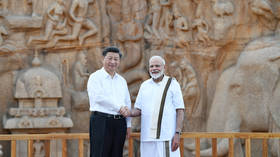
Xi Jinping shakes hand Minister Narendra Modi during their visit to the outskirts of Chennai © India's Press Information Bureau/Handout via REUTERS

Chinese and Indian leaders have just begun the second day of their one-in-one at India’s picturesque resort overlooking the Bay of Bengal, trading pleasantries and trying to reconcile frictions between their nations.
The second round of the informal summit between Indian Prime Minister Narendra Modi and his Chinese counterpart Xi Jinping kicked off on Saturday morning in the state of Chennai. Their one-hour meeting started at the serene Fisherman's Cove resort and then continued on the beach washed by the Bay of Bengal, according to Indian media.
It mostly revolved around economic cooperation and struggle against extremism that plagues both India and China. Modi in Xi had also apparently tried to iron out wrinkles that emerged after New Delhi revoked autonomy status of its Jammu and Kashmir state that borders China.
“We had decided that we will manage our differences prudently and won't allow them to turn into disputes,” Modi told Xi, to which he replied: “Yesterday Prime Minister as you said, you and I had engaged in candid conversations like friends, heart to heart discussions on bilateral relations. And, I look forward to further discussions.”
218 people are talking about this
Of course, there has been no shortage of mutual praise and reference to history. Modi, a conservative Hindu politician, said India and China have been economic powers that traded with one another “for the most part of the last 2000 years.” He recalled their first informal summit at China’s Wuhan last year that gave “a fresh momentum” and boosted “strategic communication between our two countries.”
This year’s one-in-one spelled “the start of a new era in India-China relations,” PM Modi offered.
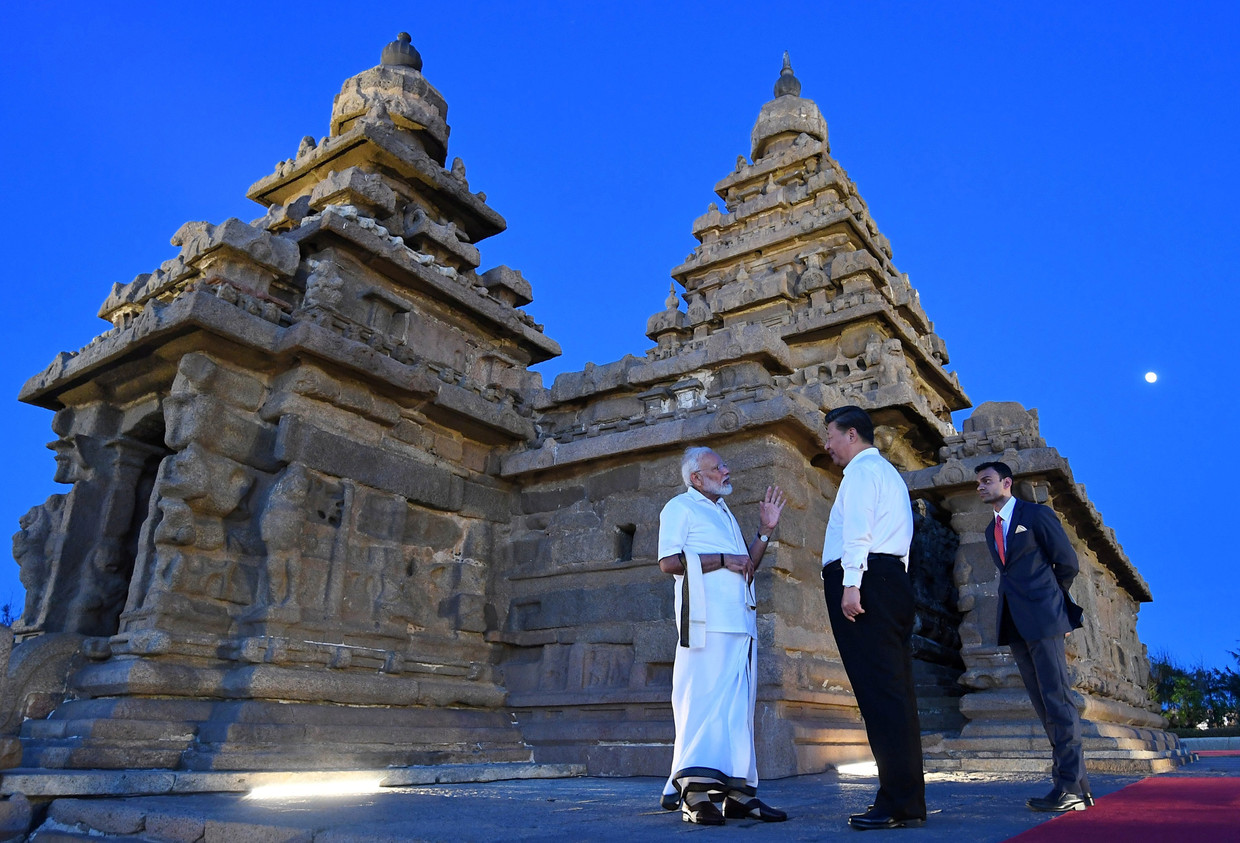
Xi Jinping and Narendra Modi talk during their visit to the Shore temple in Mamallapuram on the outskirts of Chennai © India's Press Information Bureau/Handout via REUTERS
Earlier on Friday, he unleashed a charm offensive on XI, taking him on a personal tour of temples and monuments in the coastal town of Mamallapuram which has historical India-China ties.PHOTOThey also had extensive talks over dinner at which Xi was treated to range of local specialties from the region.
4,738 people are talking about this
That meeting went beyond schedule, with the leaders talking for two and a half hours. Previously, Modi posted a few tweets in Chinese after arriving in Chennai, saying he hoped the meeting with Xi would lead to stronger bilateral ties.
ALSO ON RT.COM
https://www.rt.com/news/470773-xi-modi-summit-india/
HomeWorld News
Modi declares ‘start of new era’ in India-China relations in ‘heart-to-heart’ talks with Xi
12 Oct, 2019 09:04 / Updated 33 minutes ago
Xi Jinping shakes hand Minister Narendra Modi during their visit to the outskirts of Chennai © India's Press Information Bureau/Handout via REUTERS
- 6

Chinese and Indian leaders have just begun the second day of their one-in-one at India’s picturesque resort overlooking the Bay of Bengal, trading pleasantries and trying to reconcile frictions between their nations.
The second round of the informal summit between Indian Prime Minister Narendra Modi and his Chinese counterpart Xi Jinping kicked off on Saturday morning in the state of Chennai. Their one-hour meeting started at the serene Fisherman's Cove resort and then continued on the beach washed by the Bay of Bengal, according to Indian media.
It mostly revolved around economic cooperation and struggle against extremism that plagues both India and China. Modi in Xi had also apparently tried to iron out wrinkles that emerged after New Delhi revoked autonomy status of its Jammu and Kashmir state that borders China.
“We had decided that we will manage our differences prudently and won't allow them to turn into disputes,” Modi told Xi, to which he replied: “Yesterday Prime Minister as you said, you and I had engaged in candid conversations like friends, heart to heart discussions on bilateral relations. And, I look forward to further discussions.”
Raveesh Kumar
✔@MEAIndia
https://twitter.com/MEAIndia/status/1182915074236637184
#ChennaiConnect | A relationship with a canvas as broad as the ocean
PM @narendramodi & Chinese President Xi continue their discussions on 2nd day of Informal Summit. Direct contacts between the leadership have been instrumental in consolidating strategic communication.
1,147
3:05 PM - Oct 12, 2019
Twitter Ads info and privacy
218 people are talking about this
Of course, there has been no shortage of mutual praise and reference to history. Modi, a conservative Hindu politician, said India and China have been economic powers that traded with one another “for the most part of the last 2000 years.” He recalled their first informal summit at China’s Wuhan last year that gave “a fresh momentum” and boosted “strategic communication between our two countries.”
This year’s one-in-one spelled “the start of a new era in India-China relations,” PM Modi offered.
Xi Jinping and Narendra Modi talk during their visit to the Shore temple in Mamallapuram on the outskirts of Chennai © India's Press Information Bureau/Handout via REUTERS
Earlier on Friday, he unleashed a charm offensive on XI, taking him on a personal tour of temples and monuments in the coastal town of Mamallapuram which has historical India-China ties.PHOTOThey also had extensive talks over dinner at which Xi was treated to range of local specialties from the region.
Narendra Modi
✔@narendramodi
https://twitter.com/narendramodi/status/1182700242929475585
Mamallapuram is one of the most beautiful places in India, full of vibrancy. It is linked to commerce, spirituality and is now a popular tourism centre.
I am delighted that President Xi Jinping and I are spending time in this scenic place, which is also a @UNESCO heritage site.
21.4K
12:51 AM - Oct 12, 2019
Twitter Ads info and privacy
4,738 people are talking about this
That meeting went beyond schedule, with the leaders talking for two and a half hours. Previously, Modi posted a few tweets in Chinese after arriving in Chennai, saying he hoped the meeting with Xi would lead to stronger bilateral ties.
ALSO ON RT.COM


